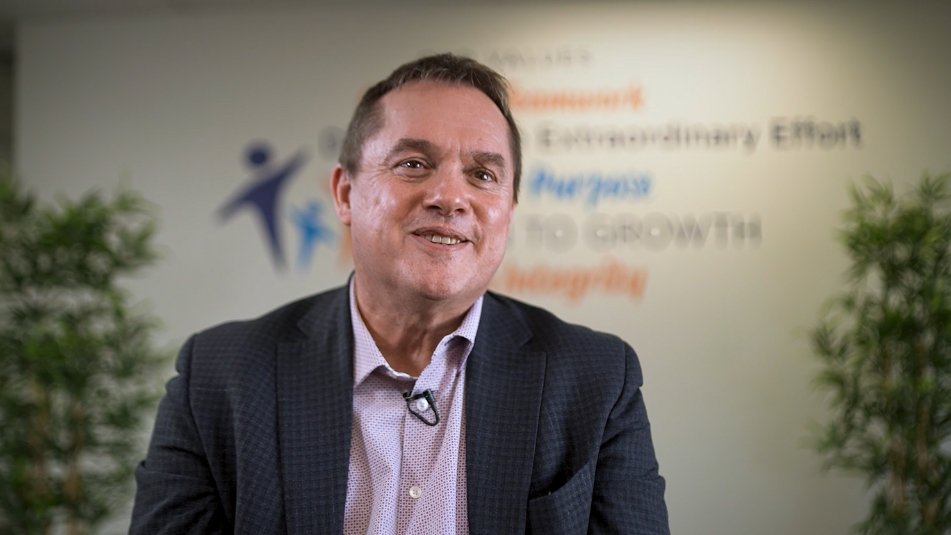Cresa Board Member Spotlight: Q & A with Angela Roseboro
Cresa is committed to building an inclusive workplace that encourages, supports, and celebrates the diverse voices of our employees. Our employee spotlight series gives our team members the opportunity to share their unique experience.
Angela Roseboro is a member of Cresa’s Board of Directors and the Chief Diversity Officer of Riot Games, where she develops and implements initiatives to drive inclusion and cultural growth. During her more than twenty years of human resource experience, Angela has held positions leading diversity and inclusion, talent management, and leadership development for companies in the technology, financial services, asset management, government, entertainment, and manufacturing industries. Prior to joining Riot, Angela was the Global Head of Diversity, Equity, and Inclusion at Dropbox. Previously she provided human resource guidance to Fortune 500 companies including T. Rowe Price, Jones Lang LaSalle, Genworth Financial, Whirlpool Corporation, and Manpower International. Angela has received numerous awards and recognitions for her work including Black Enterprise’s 150 Diversity Executive, The Network Journal’s 25 Influential Black Women in Business, and 50 Out Front for Women’s Leadership, Diversity and Inclusion.

How did you get into the industry?
I joined Jones Lang LaSalle (JLL) in 2010 as the firm’s second Chief Diversity Officer. I was responsible for developing and implementing the firm’s diversity and inclusion strategy. In the beginning, I got to meet with many of our clients who would ask questions about our diversity and inclusion efforts. They wanted to know the company that they did business with had a similar commitment to diversity and inclusion. The real estate industry isn’t very diverse and created strategies to address both attraction and development of talent by implementing processes that would ensure diverse candidates on interviewing slates, identifying entry points, and holding leaders accountable for sponsoring and developing diverse talent. I created JLL’s first-ever Women’s Summit to connect talent with each other and with leaders. As a Chief Diversity Officer, you don’t own many processes, or you’re typically not the person who makes decisions about the business. My greatest opportunity to make change was to influence and enable leaders to operationalize diversity and inclusion by making it part of their performance objectives. To get that done, I had to build relationships while learning the business, our strategies, and our clients. I would shadow business deals to see how the dynamics worked. I saw firsthand the connection between diversity and business. We conducted an analysis of our deals and discovered that all deals over $1M had a diverse team. I loved that statistic because whenever I was asked why diversity and inclusion were important, our ‘why’ was clear.
What are some challenges you encountered during your career and how did you overcome them?
One of my early mentors used to tell me – if you can’t go through the door, go through a window. I took her advice to mean that there will always be challenges and barriers, but you will learn from them and find a way. Most times, I was the “only” in the room, so showing up and creating space for my perspectives were at times both intimidating and overwhelming. Being knowledgeable and delivering results that added value to the organization enabled me to be confident and credible. Having said that, I also truly believe that if you are going to be at the table, then you should be at the table, meaning you are there for a reason and should not spend time questioning whether you belong there because you do. Having a sponsor that not only knows and believes in you and your capabilities but who is also willing to stand up for you when needed to overcome obstacles was crucial for me. One of my biggest challenges was trying to balance my personal and professional life. Quite honestly, I am still working on creating healthy boundaries between my home and work life. I think that trying to achieve total balance is a fallacy (or I just have not found it). I am a mother of two, a wife, an aunt, and a friend – juggling all of that is a challenge, juggling all that well I have found to be impossible. Having a supportive partner helps, but what I have come to appreciate is that I had to let some things go and make time to be present for my family. My girls are thirty-one and twenty-two and that time has flown by. They are the best investment I have made so far. I also learned to give myself grace and let go of my need to be perfect. We are all imperfect beings living in a world with other imperfect beings. I used to be focused on winning battles. I now focus on winning wars. Overcoming challenges is about being prepared, finding allies, learning, and inviting growth while, at the same time, recognizing that there are some things that you cannot and should not own.
Why are you passionate about what you do?
I would describe what I do as more of my purpose than my passion. Passion describes an emotion or something you feel deeply about where purpose speaks to your aim or goal. I’m driven by fairness and equity. I was the kid that, if someone was being bullied, I would jump in to try to protect them, or if a teacher would make exceptions for one kid, I would advocate that they make the exception for all of us. It’s funny looking back on this now because sometimes speaking out and demanding fairness would have its consequences (I spent a lot of time in detention), but I was okay to pay the price if it changed the situation. I always felt that companies are successful because of their people and not in spite of them. My goal or aim as a Chief Diversity Officer is to remove obstacles, create access, and create an environment where each employee can unleash their superpowers. For me diversity and inclusion are not about creating advantages for some, it is about removing barriers for all. My purpose is to allow for greatness and acceptance by those who may have otherwise been dismissed. One of the best movies that captures what I mean is the movie 42, where Branch Rickey’s greatest business challenge was the case of integrating baseball. He didn’t just tell Jackie Robinson to go play baseball, he was also his mentor, his advocate, and his coach. He made sure that Jackie was successful, and where needed he moved obstacles out of his way. That year Jackie Robinson was Rookie of the Year and won the World Series. Rickey saw Jackie’s potential for greatness and understood that if Jackie won, the franchise won. Also, as a mother of Black daughters, I want them to be who they are and be judged for what they bring. We’re trying to make it better for the next generations. Whenever I get nervous or hesitant about pushing the envelope, I think of my daughters.
Are there any projects or contributions to Cresa that you would like to speak to?
As a Board member, I always think about the perspective of “difference.” I’m the only Black person and the only woman on this Board. I appreciate that the CEO was intentional in bringing me onto the Board. It’s a recognition that there’s a perspective that’s missing – and he wanted someone who knows real estate, who knows people, and who knows talent. I’m a strategist and problem solver, first. In the people business, your talent is the most important asset you have.
How do you think we can better promote DIB within the CRE industry?
I don’t see diversity, inclusion, and belonging as something to promote. For me, that is not the goal. I would much rather see the evidence of what companies are doing by their results. Representation matters. It is one thing to tout your programs and initiatives, but if that doesn’t translate into more representative producer roles, or roles other than administrative and corporate, then we have to take a second look and be bold enough to make the necessary changes. I think that we have to change the conversation. Describing DIB as “the right thing to do,” or that it meets some social responsibility objective is well-intentioned, but it keeps us away from seeing DIB as a business strategy. We need to shift the mentality from creating a business case for diversity to one where diversity and inclusion is the case for business because at the heart of any business there are people. When the value of diversity and inclusion is understood in the same way as a company’s financial strategy or marketing strategy, then the conversation changes.
If there is anything else you would like to share, please include your final comments here.
I think that this conversation is wildly uncomfortable for the wrong reasons. For us to make change, we have to make space to hear and allow people to own where they sit. In my day job, I don’t try to convince you that this is the right thing. I try to help people understand their "why" and why they believe in that why. You may say that makes sense, but then I say that we have to be willing to sit in that discomfort to get to the "Why?" I know that no one wants to do that, to work through it, but that is going to be the basic conversation we’re going to have to have. I would encourage people to sit in that discomfort. Sit in it and be curious about it. On the other end, I get it that no one wants to feel attacked; however, here is where I ask for grace and understanding, and a willingness to approach this with curiosity. If we’re both curious about the other point of view, and we can talk about solutions on how we get to some mutual ground, then maybe there is hope.


